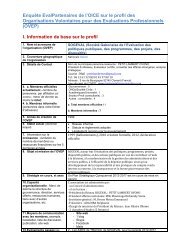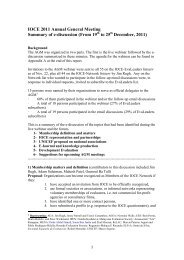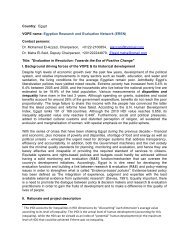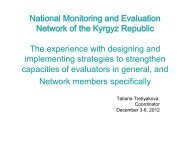The Program Evaluation Standards in International Settings
The Program Evaluation Standards in International Settings - IOCE
The Program Evaluation Standards in International Settings - IOCE
You also want an ePaper? Increase the reach of your titles
YUMPU automatically turns print PDFs into web optimized ePapers that Google loves.
Considerations on the Development of Culturally Relevant <strong>Evaluation</strong> <strong>Standards</strong> 37C2 - Conflict of InterestConflict of <strong>in</strong>terest, frequently unavoidable, should be dealt with openly and honestly, sothat it does not compromise the evaluation processes and results (Jo<strong>in</strong>t Committee, 1981,p.63).This standard would be less important <strong>in</strong> India, or at least would be construed verydifferently. S<strong>in</strong>ce evaluations are done at the federal level by <strong>in</strong>dividuals specifically chosen fora po<strong>in</strong>t of view consistent with the official position, it would be expected an accepted that theevaluator would have what, <strong>in</strong> a U.S. view, would be considered a conflict of <strong>in</strong>terest. In India,the evaluator would not be considered to be <strong>in</strong> a conflict of <strong>in</strong>terest situation. One would notparticularly ga<strong>in</strong> anyth<strong>in</strong>g by employ<strong>in</strong>g an <strong>in</strong>dependent po<strong>in</strong>t of view. S<strong>in</strong>ce the political systemis one of majority control, without the two party checks and balances of the U.S. system,<strong>in</strong>dependent viewpo<strong>in</strong>ts would be considered neither prudent nor necessarily laudable.C3 - Full and Frank DisclosureOral and written evaluation reports should be open, direct, and honest <strong>in</strong> their disclosure ofpert<strong>in</strong>ent f<strong>in</strong>d<strong>in</strong>gs, <strong>in</strong>clud<strong>in</strong>g the limitations of the evaluation (Jo<strong>in</strong>t Committee, 1981,p.63).In both Malta and India, one would simply never write anyth<strong>in</strong>g that would jeopardizesomeone’s job, except for political reasons, as, for example, if one were <strong>in</strong> a politicallyadversarial position. Otherwise, plac<strong>in</strong>g someone <strong>in</strong> jeopardy would be considered <strong>in</strong>appropriatebehavior. Such <strong>in</strong>formation might be orally communicated, but never written. Thus a U.S.evaluator would need to modify the nature and content of written reports <strong>in</strong> ways likely toviolate the orig<strong>in</strong>al (U.S.) <strong>in</strong>terpretation of this standard.C5 - Rights of Human Subjects<strong>Evaluation</strong>s should be designed and conducted, so that the rights and welfare of the humansubjects are respected and protected (Jo<strong>in</strong>t Committee, 1981, p.64).Although it is important to protect the rights of <strong>in</strong>dividuals <strong>in</strong> any culture, those rightsdifferent from culture to culture. A U.S. evaluator would have to modify the application of thisstandard to fit the Maltese and Indian cultures. For example, what constitutes <strong>in</strong>jury and redress<strong>in</strong> these cultures is different from the U.S. In the U.S., reputation and mental health are viewedas possessions or property of the <strong>in</strong>dividual, the damage of which can be translated <strong>in</strong>to dollarsso that redress can be made <strong>in</strong> f<strong>in</strong>ancial terms. In Malta or India, litigation is common over landor personal property, but not over reputation or mental health, which are not possessed by the<strong>in</strong>dividual <strong>in</strong> the U.S. sense. Individuals <strong>in</strong> these two cultures do not take offense as readily andredress may be <strong>in</strong> more symbolic ways, such as public apology.






